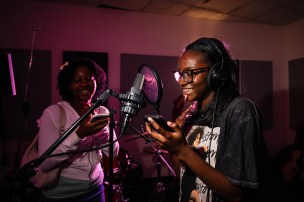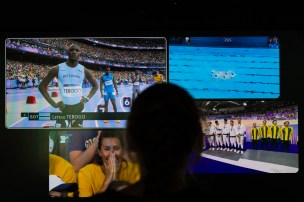Published on
Dominique Biron turned weaknesses into strengths on her way to the NCAA track and field championships
The fifth-year Northeastern heptathlete will be competing on Friday (ESPN2) and Saturday (ESPN), June 7 and 8, in Eugene, Oregon. And she’ll do so knowing that the hard work was crucial to defining herself to her liking.
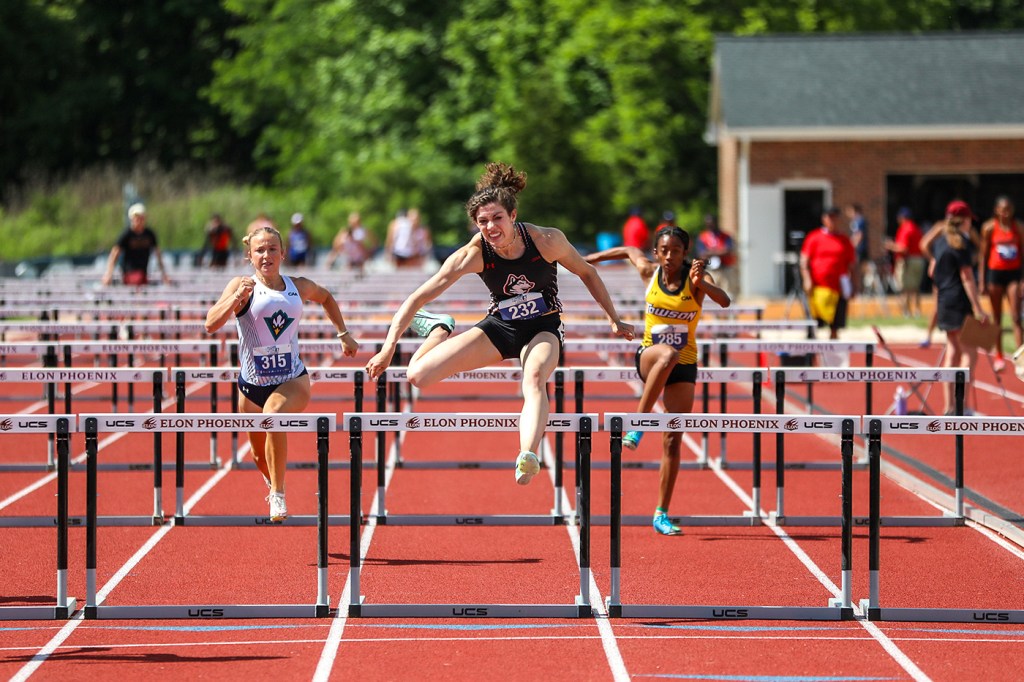
Dominique Biron used to believe her ultimate goal was beyond reach. But this week, in spite of those doubts, the fifth-year student-athlete at Northeastern University will be competing among the nation’s top 24 heptathletes at the NCAA Division 1 Outdoor Track And Field Championships in Eugene, Oregon.
“If you had told me in high school,” she says, “I’d have thought you were absolutely out of your mind.”
Years of tireless effort have kicked open all kinds of doors — including a potential career with USA Rugby in a sport she has never played.
“She’s absolutely one of the most talented athletes I’ve seen,” Northeastern head track coach Tramaine Shaw says of Biron. “And she’s up there in the top two I’ve ever coached in terms of the dedication to the things that make athletes good and great.”
Biron is the first woman from Northeastern since 2007 to advance to the NCAA outdoor championships. Joining her in Eugene will be graduate student Alexander Korczynski, who will be competing at the NCAAs for the third time in the 3,000-meter steeplechase.
Biron typically has been the last to recognize her potential. She acknowledges being hard on herself while embracing the reasons why.
“I have a language-based learning disability as well as ADHD,” Biron says. “Sometimes I’m misunderstood — like I cut straight to the point and I’m really blunt.”
She developed her own approach to learning. “It takes me a little longer to get there,” Biron says. “But once I’ve got it, I’ve got it.”
Having attention-deficit/hyperactivity disorder has complicated her academic and athletic lives.
“For me school was always really hard,” Biron says. “And athletics was my escape, because athletics was where I could put in the time and see the results come out. Whereas I felt in the classroom I could put in more time than the students around me — and they would get the results that I wanted.”
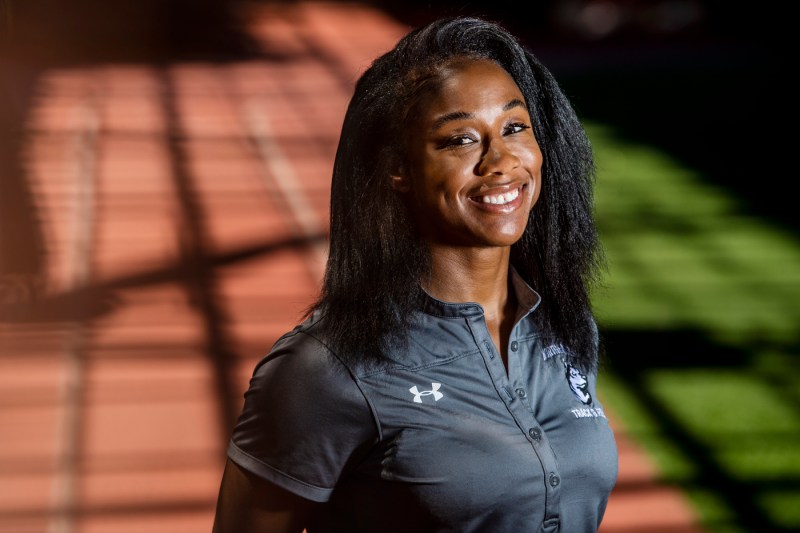
For years, says Biron, her teammates and coaches cautioned her against overworking while she developed the array of skills demanded by the seven-event heptathlon — 100-meter hurdles, high jump, shot put, 200 meters, long jump, javelin and 800 meters.
She’ll be displaying the finished product on Friday (ESPN2) and Saturday (ESPN), June 7 and 8, at the NCAA championships. And she’ll do so knowing that the hard work was crucial to defining herself to her liking at Northeastern.
“If I exhaust myself, then it’s easier to focus on academics,” Biron says. “That way I don’t feel like I need to get out that energy. So then I feel like I can sit down and actually focus instead of wanting to get up and do something.”
Biron’s family attended her graduation ceremony last month at Fenway Park, showing their love and appreciation for someone who has competed in every phase of her life.
“I graduated with honors, which was really awesome,” says Biron, who majored in business and design with a minor in psychology. “My first year I was worried that I wasn’t going to graduate. I hadn’t been diagnosed yet and I was having a really hard time.”
YouTube videos were crucial
Biron played a variety of sports while growing up in Bow, New Hampshire. Track and field emerged as her centerpiece despite an absence of detailed coaching.
“After practice my mom (Donna) would stay out with me for three hours and I would just keep practicing,” Biron says. “She was basically my coach — and she never did track. So the fact that she was so willing to go so far and put so much into it for me meant a lot.”
Donna Biron would search her phone for YouTube videos of the events her daughter was trying to learn.
“We would watch pro athletes compete and she would be like, ‘This person leans more over the hurdles than you do’ or ‘reaches further towards their feet than you do,’” Dominique Biron recalls. “She was trying to find little things that I wasn’t doing.
“You would see us at the high jump mat or the long jump pit or the hurdles. We would stay those three hours after practice until I felt like I’d learned something and was feeling good about it.”
Biron moved on to Cushing Academy, a Massachusetts preparatory school where in two years she set school records in the 200 meters, 400 meters, 100-meter and 300-meter hurdles, long jump, high jump, javelin and two relays. Northeastern appealed to her in part because of the winning efforts of coach Tramaine Shaw, a former Husky sprinter whose women’s and men’s teams swept the recent Coastal Athletic Association outdoor championships.
“I wanted to be around a team that would push me,” Biron says. “I wanted to have that atmosphere where I could be competitive. I wanted to be surrounded by people who were really strong.”
COVID-19 heightened the anxiety
“Going from mediocre to good is easy,” Shaw says. “Going from good to great is incredibly hard. Because those bridges of difference are so small. Every little thing truly does count when you’re trying to go from good to great and she has always been the type of athlete who is going to drill down on the little things.”
Shaw acknowledges it hasn’t been easy helping Biron maintain perspective amid her profound investment in the sport.
“It has definitely had its moments,” Shaw says. “I think it’s not just an indication of her, but to some degree her entire generation. And I say this not being too far removed from when I was an athlete.”
Shaw became a Northeastern Hall-of-Famer as a record-setting sprinting and hurdling star from 2005 to 2009. She had no thought of coaching until her final season, when teammate Jonathan Hall was thinking of quitting the team.
“I said, ‘If you stay, I’ll stay around and help you out,’” Shaw recalls of Hall, who holds Northeastern’s fourth-best time in the 400-meter hurdles. “I started coaching to help a teammate out because I really cared about my team. And here we are many, many years later.”
After nine seasons as an assistant coach, Shaw ascended in 2017 to interim head coach of the Northeastern women’s and men’s teams before taking over officially in 2018. She has won nine CAA coach of the year awards, the most in conference history.
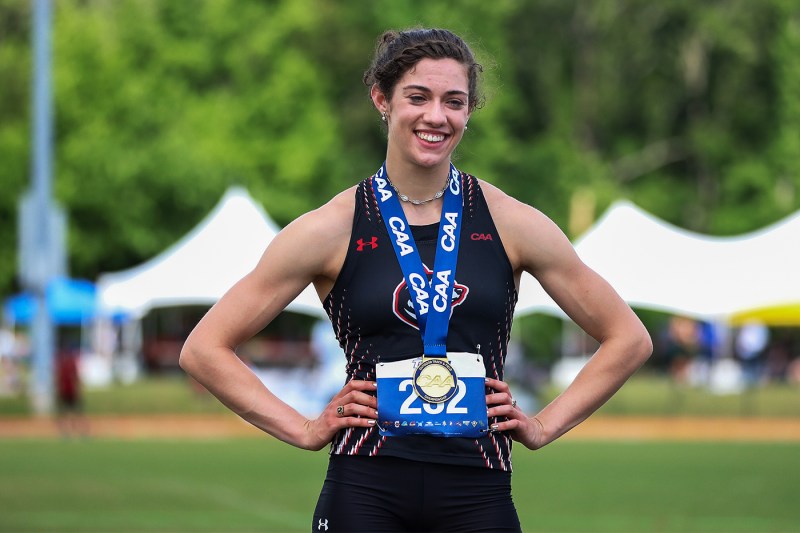
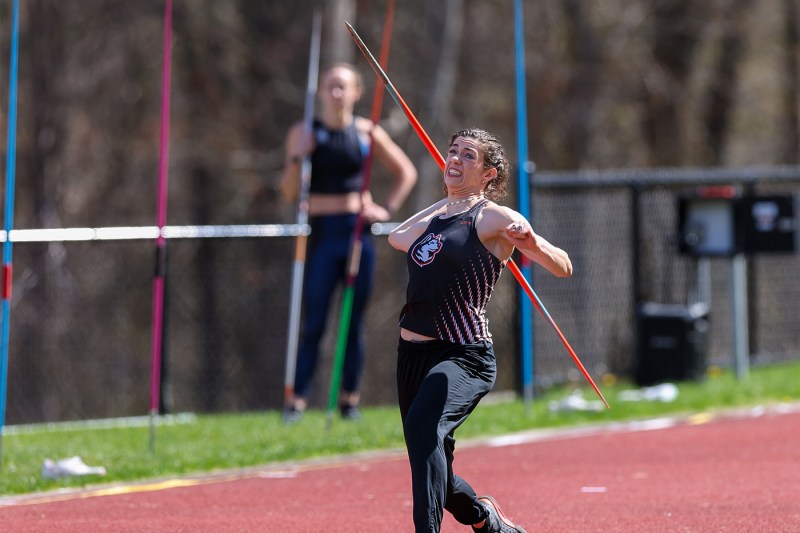
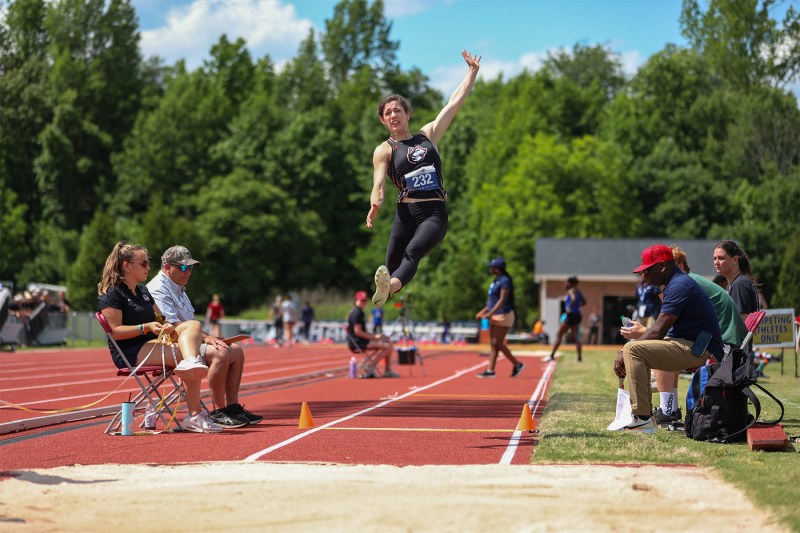
Sensing the pressures of the COVID-19 pandemic, Shaw chose to spend less time on recruiting while devoting more energy than ever to the athletes — including Biron — who were already enrolled at Northeastern.
“The needs of the current students were so great that we put a lot of recruiting on hold,” Shaw says. “I recognized we needed to spend more time investing in our current student-athletes and readjusting the culture of the program. We’re in a great place now.”
Shaw says the pandemic intensified a new level of anxiety that many student-athletes were experiencing.
“When I was an athlete, I could have a bad day,” Shaw says. “But never once did a bad day or a bad race make me feel like I was a bad athlete. Failure was part of the process. It happens.
“I think for her generation as a whole,” Shaw says of Biron and her teammates, “a bad race sometimes makes them feel like they are no longer a good athlete.”
It was from that point of view that Shaw would ask Biron to lessen her after-hours workouts.
“Sometimes trying to help her protect herself can be difficult because if she doesn’t do something right, she wants to do it until she gets it right,” Shaw says. “Getting her to understand that failure is part of the process, that you have to fail in order to succeed, that you have to be able to take that risk that it is not going to turn out right so in that way you can build and grow to the next thing — it has definitely been challenging.”
‘I’ve never been more proud of her’
Looking ahead to her current farewell season, Biron asked that she be coached personally by Shaw.
“I have really bad anxiety,” Biron says. “And she has so much knowledge. She was an athlete and so she’s able to say to me, ‘You feel this way because of this.’”
Shaw’s advice is therapeutic on multiple fronts, Biron says.
“It helps broaden my track and field knowledge,” Biron says. “Which then makes me feel better about the event.”
Their relationship was growing beyond the technical aspects.
“She was just really adamant that, ‘This is my last year and you know me the best,’” Shaw says. “‘I just really feel like I know who I am as a person. I know that I can rub people the wrong way sometimes. I know we have a strong staff but I feel like you and I work the best together.’ And she was really adamant that she wanted that for her last year.”
During the CAA outdoor championships last month, Shaw worried that Biron was waiting too long to start competing in the high jump.
She’s absolutely one of the most talented athletes I’ve seen. And she’s up there in the top two I’ve ever coached in terms of the dedication to the things that make athletes good and great.
Tramaine Shaw, Northeastern’s head track coach
“I was watching her make these decisions and I was like, ‘Should I step in? Should I let her go?’” Shaw says. “I decided, no, I have to let her go. Dom can be stubborn and sometimes me saying something is going to throw her off her game.”
Instead of competing at a lower height and assuring herself of points, Biron went scoreless in the high jump. Despite winning the other events, that strategic error cost her the gold medal. She took second place in the heptathlon.
“But how she handled that after — I’ve never been more proud of her than I was in that moment,” Shaw says. “She continued to be a good teammate. She continued to fight through every event.”
Biron, who also won the long jump and finished fifth in the high jump, was named outstanding field performer — the fourth straight year she had been honored as the top women’s athlete in field events or at the meet overall.
“She stepped away, let herself have a moment to gather herself, and then she fought and outperformed anything she had done to that point and managed to get all the points she needed to get — plus some — for the team. And so seeing her have that moment, accepting it, moving on from it and building from it, was just absolutely amazing.”
It was in failure that the champion showed the depth of her growth, Shaw says.
“I definitely think there’s been challenges over the years,” Shaw says. “But watching how she reacted and responded at both the indoor and outdoor conference [championships] where things did not go her way gives me a lot of confidence that she recognizes where she needs to grow and is going to continue to work at it bit by bit.”
A rugby career?
Biron is looking forward to the NCAAs as her final meet.
“I’m good but I’m also not one of the best in the world,” Biron says. “And I’m completely aware of that. So I’m ready for something new.”
A few days after the NCAAs, Biron will be among 18 women who will be invited to the Olympic training center in California to try out for USA Rugby, which is seeking crossover athletes to compete in Rugby Sevens for the 2028 Summer Olympics at Los Angeles.
Editor’s Picks
“I’m so excited — I literally can’t help myself, the idea that they even thought about taking this little girl from Bow, New Hampshire,” Biron says. “I was so curious, I asked them, like, ‘How in the world did you find me — and why me?’”
She was told that USA Rugby searched among the top multi-event women athletes while focusing on graduating seniors.
“And then they looked at photos of people competing,” says the 5-foot-8-inch Biron, who grew up playing boys’ ice hockey. “And they said to me, which I thought was hilarious, they’ve never seen that type of aggression brought to track and field.
“I know some people say I make the worst faces when I compete. I’m always grinding my teeth, everything’s super tense and I’m screaming a lot of the time. There’s a lot of strain. You can see how competitive I am on my face. And apparently that’s what they were looking for.”
If rugby doesn’t work out, Biron hopes to move into coaching. She has been working as a part-time track and field assistant coach at the John D. O’Bryant School of Mathematics and Science near Northeastern’s Boston campus.
“I really love it,” she says.
Do you see the circular element of her story? When athletes are working as hard as Biron, says Shaw, the demands they make bring out the best in their coaches, inspiring them to raise the level of coaching.
It is in that paying-it-forward spirit that Shaw is looking forward to the week in Eugene.
“I always knew she could do it,” Shaw says. “When you get to this point at NCAAs, if you can just replicate what you did to get there, you’re putting yourself in a great position to be an All-American.
“It’s just an honor for me to be there,” Shaw adds. “I’m her plus-one.”
This was always the dream.
“The biggest thing is just making it,” Biron says. “It’s what I wanted the entire time I’ve been here. So I just want to go out and have fun.”
Imagine how Dominique Biron might perform without feeling pressure.
“Yes,” she says with a short laugh. “This will be a first.”
Ian Thomsen is a Northeastern Global News features writer. Email him at i.thomsen@northeastern.edu. Follow him on X/Twitter @IanatNU.






